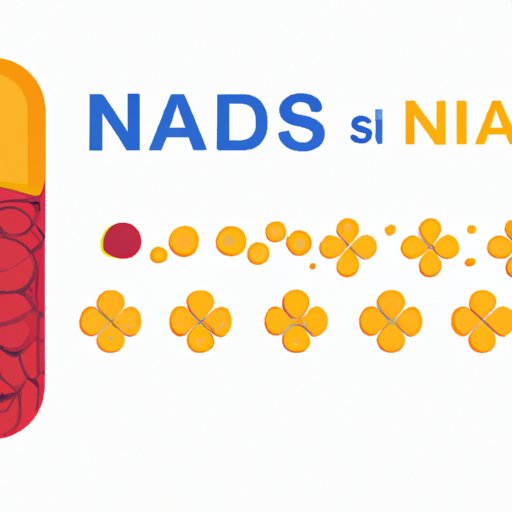Introduction
Nonsteroidal anti-inflammatory drugs (NSAIDs) are a type of medication used to treat a variety of conditions, including pain, inflammation, and fever. They are commonly used for short-term relief of mild to moderate pain, such as headaches, muscle aches, menstrual cramps, and toothaches. Some types of NSAIDs are available without a prescription; others require a prescription from a doctor.
This article will provide an overview of the safe use of NSAIDs, including recommended dosages, potential risks and side effects, and natural alternatives. You will also find answers to some common questions about taking NSAIDs safely.
A Comprehensive Guide to Safely Taking NSAIDs
Before taking any NSAID, it’s important to understand the different types and their recommended dosages. NSAIDs can be taken orally or topically (on the skin). Oral NSAIDs include ibuprofen, naproxen sodium, and aspirin. Topical NSAIDs include creams, gels, and patches. Each type has its own recommended dosage, so it’s important to read the label or ask your doctor or pharmacist if you have questions.
It’s also important to know your risk factors for taking NSAIDs. People who are pregnant, breastfeeding, or have certain medical conditions, such as asthma or kidney disease, should talk to their doctor before taking any NSAID. It’s also important to be aware of potential drug interactions. NSAIDs can interact with other medications, including blood thinners and diuretics, so it’s important to tell your doctor about all the medications you are taking.
How Much NSAID Can I Take Without Risking Side Effects?
The amount of NSAID you can take safely depends on several factors, including your age, weight, and medical history. Maximum daily doses vary by type of NSAID, so it’s important to read the label or ask your doctor or pharmacist for advice. In general, adults should not take more than 3200 mg of ibuprofen, 1500 mg of naproxen sodium, or 4500 mg of aspirin per day.
It’s also important to note that taking too much NSAID can increase your risk of serious side effects, such as stomach ulcers, bleeding, and kidney damage. If you experience any of these symptoms, seek medical attention immediately.

NSAIDs: What You Need to Know About Proper Use and Safety
When taking NSAIDs, there are some important precautions to keep in mind. It’s important to take the medication exactly as prescribed by your doctor. Do not take more than the recommended dose, and do not take the medication for longer than directed. NSAIDs should also be stored out of reach of children, and disposed of properly when no longer needed.

A Review of Common Questions About Taking NSAIDs Safely
What are the short-term and long-term side effects of taking NSAIDs? Short-term side effects may include upset stomach, nausea, vomiting, and headache. Long-term side effects may include an increased risk of heart attack, stroke, and kidney damage. It’s important to talk to your doctor if you experience any side effects while taking NSAIDs.
Is it safe to take NSAIDs with other medications? It’s always important to tell your doctor about all the medications you are taking, both prescription and over-the-counter. Certain medications, such as blood thinners and diuretics, can interact with NSAIDs, increasing your risk of side effects.
Are there any natural alternatives to taking NSAIDs? Yes, there are several natural alternatives to taking NSAIDs, such as acetaminophen, turmeric, and ginger. However, it’s important to talk to your doctor before trying any natural remedies, as some may not be safe for certain people.
Conclusion
NSAIDs are a type of medication used to treat a variety of conditions, including pain, inflammation, and fever. Before taking any NSAID, it’s important to understand the different types and their recommended dosages, as well as potential risks and side effects. The amount of NSAID you can take safely depends on several factors, including your age, weight, and medical history. When taking NSAIDs, it’s important to take the medication exactly as prescribed by your doctor and store and dispose of them properly.
Taking NSAIDs safely is essential to avoiding serious side effects. This article has provided an overview of the safe use of NSAIDs, including recommended dosages, potential risks and side effects, and natural alternatives. By following these guidelines, you can ensure that you are taking NSAIDs safely and effectively.
(Note: Is this article not meeting your expectations? Do you have knowledge or insights to share? Unlock new opportunities and expand your reach by joining our authors team. Click Registration to join us and share your expertise with our readers.)
